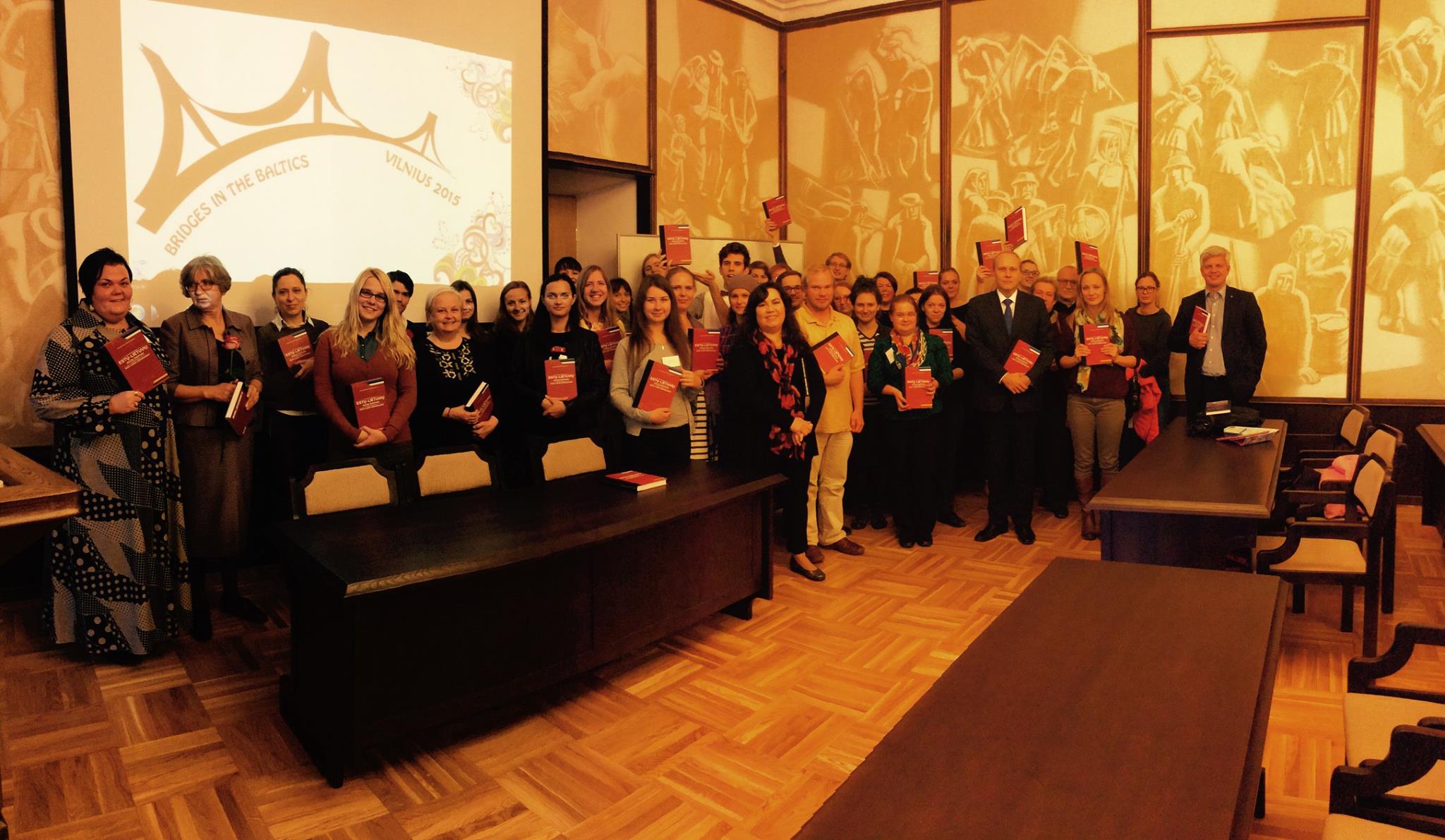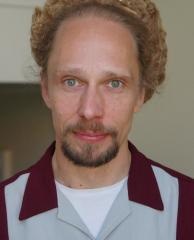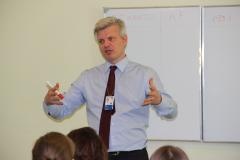BALTIC STUDENT CONFERENCE BRIDGES IN THE BALTICS
Vilnius 2015
 3rd Baltic Student Conference “Bridges in the Baltics” was held at the Vilnius University (Vilnius, Lithuania) on 2–3 October 2015. The conference was dedicated to the European Day of Languages.
3rd Baltic Student Conference “Bridges in the Baltics” was held at the Vilnius University (Vilnius, Lithuania) on 2–3 October 2015. The conference was dedicated to the European Day of Languages.
Presentations were given by 33 students from 8 countries (Lithuania, Latvia, Estonia, Finland, Poland, UK, France, USA)
PLENARY SPEAKERS
 Dr. Vilius Ivanauskas, Senior research fellow Lithuanian institute of history
Dr. Vilius Ivanauskas, Senior research fellow Lithuanian institute of history
Short bio of the author: Dr. Vilius Ivanauskas is a senior research fellow at the Lithuanian institute of history. His areas of interest are soviet intellectuals, nationalism in soviet peripheries (Baltic states, Caucasus) and the politics of history. In the period November 2012 to June, 2013 he was Fulbright scholar at UC Berkeley. In 2009-2011 he was postdoctoral research fellow and lecturer at Institute of International relations and political science at Vilnius University. His recent article: ‘Engineers of the human spirit’ During Late Socialism: the Lithuanian union of writers between soviet duties and local interests’, in Europe-Asia studies 2014 (Volume 66, Issue 4, 2014). In 2011 he published his monograph “Lithuanian nomenklatura in bureaucratic system: between stagnation and dynamics (1968-1988)”. He is the author over of 20 other articles, and the member of Association of Slavic, Eastern Europe and Eurasian studies (ASEEES), In April, 2009 he became a laureate (1 of 3 best dissertation of social-humanitarian sciences) in the contest „Best Doctoral Dissertations of 2008 in Lithuania“, organized by Lithuanian Society of Young scientists.
Conference abstract “After Empire: How much Soviet History is needed for our Future?” Soviet history increasingly becomes the object marking not only complexity of the historic interpretations, but also political rivalries, identities policies and geopolitical orientations. Today Baltic States attempts to move from post-Soviet reality, fully consolidate integration to the West, ensure the security and avoid the aggression of Russia. Famous question of Eric J. Hobsbawm “How much history is required for the future” could be re-phrased by emphasizing differences between practical and analytical approach towards Soviet past, and revealing different layers of Soviet history, which describes such important moments for state identity as the loss of independence, deportations, Soviet modernization, urbanization, nationalism in Soviet peripheries and play of nostalgia in today’s political context.
 Ringo Ringvee (MTh, University of Helsinki; PhD, University of Tartu) holds an academic position of Professor extraordinarius of Comparative Religion at the Theological Institute of the Estonian Evangelical Lutheran Church. He holds a post of adviser at the Religious Affairs at the Ministry of the Interior of Estonia. He is also affiliated with the University of Tartu as a member in research group for religious studies at the Center of Excellence in Cultural Theory. He has published articles on the relations between the state and religious associations in the Baltic States as well as contemporary religious situation in Estonia. His recent publications include “Religion and Nation-Building in Estonia: Some Perspectives on Secular Society,” in G. Simons and D. Westerlund (eds.). Religion, Politics and Nation-Building in Post-Communist Countries, Ashgate (2015), ‘Religion: Not declining but changing: What do the population censuses and surveys say about religion in Estonia?’ Religion, 2014 (44(3)), ‘The State, New Religious Movements, and Legislation on Religion: A Case Study of Three Baltic States.’ in David M. Kirkham (ed.). State Responses to Minority Religions. Ashgate (2013), ‘Regulating Religion in a Neoliberal Context: The Transformation of Estonia,’ in T. Martikainen and F. Gauthier (eds.). Religion in the Neoliberal Age: Political Economy and Modes of Governance, Ashgate (2013).
Ringo Ringvee (MTh, University of Helsinki; PhD, University of Tartu) holds an academic position of Professor extraordinarius of Comparative Religion at the Theological Institute of the Estonian Evangelical Lutheran Church. He holds a post of adviser at the Religious Affairs at the Ministry of the Interior of Estonia. He is also affiliated with the University of Tartu as a member in research group for religious studies at the Center of Excellence in Cultural Theory. He has published articles on the relations between the state and religious associations in the Baltic States as well as contemporary religious situation in Estonia. His recent publications include “Religion and Nation-Building in Estonia: Some Perspectives on Secular Society,” in G. Simons and D. Westerlund (eds.). Religion, Politics and Nation-Building in Post-Communist Countries, Ashgate (2015), ‘Religion: Not declining but changing: What do the population censuses and surveys say about religion in Estonia?’ Religion, 2014 (44(3)), ‘The State, New Religious Movements, and Legislation on Religion: A Case Study of Three Baltic States.’ in David M. Kirkham (ed.). State Responses to Minority Religions. Ashgate (2013), ‘Regulating Religion in a Neoliberal Context: The Transformation of Estonia,’ in T. Martikainen and F. Gauthier (eds.). Religion in the Neoliberal Age: Political Economy and Modes of Governance, Ashgate (2013).
Conference abstract “The Baltics and Religion – Differences and/or Similarities?” From geographical, economical and political perspective three Baltic countries may look quite similar and forming kind of a single entity. Nothing of this, however, holds true if to look to religion in these three countries. The differences concerning religion in all of its aspects are huge between these three Baltic States. The questions that are addressed in the speech are: What are these differences and what are the reasons behind these differences? And is there still something similar between Lithuania, Latvia and Estonia?
 Veiko Spolitis is a politician and scholar. Presently the member of the 12th Saeima, a member of the Defence and Internal Affairs Committee and still teaching at the Riga Graduate School of Law. He graduated from the University of Tartu in 1996 and from the University of Geneva in 2003. He is well versed in all Baltic languages, has a family and his hobbies are history and travel.
Veiko Spolitis is a politician and scholar. Presently the member of the 12th Saeima, a member of the Defence and Internal Affairs Committee and still teaching at the Riga Graduate School of Law. He graduated from the University of Tartu in 1996 and from the University of Geneva in 2003. He is well versed in all Baltic languages, has a family and his hobbies are history and travel.
Conference abstract “The Baltic States bridging from the Union of the Nation States to the Confederate Union – the role of civic society” Three Baltic States (3B) have been members of the Transatlantic organizations for a bit more than 10 years. It was a wise strategic decision at the end of the 20th century, however the challenges we face in the European neighborhood in he South and in the East tell us that we have enetered the period of turbulence. Ensuring the defence of our sovereignty, and the capacity of our civic societies in order to transform from traditionally ethnic into civic nations are the two of the greatest challenges we in the Baltic States face today. Common migration, external and defence policies are answers to more efficient responses to the joint challenges we face. Therefore, to allow to thrive our civic societies vigorously is as important as strengthening our three languages in public domaine (particularly in Latvia and Estonia), because only open, transparent and well run societies with basic freedoms can successfully build competitive states, and competitive states can be sustainable building blocks in the future confederate union of the European States.


